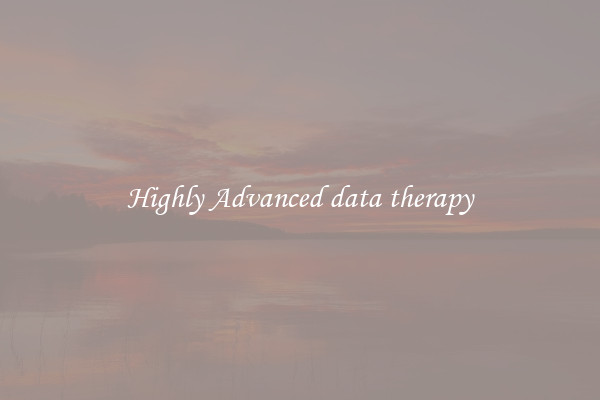Highly Advanced data therapy
Highly advanced data therapy is revolutionizing the field of mental health and wellness by harnessing the power of data analytics and technology to provide personalized and effective treatment options. This groundbreaking approach is transforming the way we view and treat mental health disorders, offering new hope to individuals struggling with various conditions.

Traditionally, therapy has relied on face-to-face sessions with a mental health professional. While this is a valuable and effective method, it is time-consuming, costly, and often inaccessible to many individuals. The advent of highly advanced data therapy addresses these limitations and opens up a world of possibilities for individuals seeking treatment.
One key feature of highly advanced data therapy is the analysis of large sets of data, such as electronic health records, to identify patterns and trends. This enables mental health professionals to develop customized treatment plans based on an individual's specific needs and circumstances. By analyzing data from various sources, including social media, wearable devices, and online forums, therapists can gain a deeper understanding of a patient's emotional state, triggers, and coping mechanisms. This detailed insight allows for targeted interventions and more effective treatment outcomes.
Moreover, highly advanced data therapy incorporates the use of artificial intelligence (AI) and machine learning algorithms to continuously monitor a patient's progress. These technologies can track mood fluctuations, sleep patterns, and other relevant data, providing real-time feedback to both the patient and therapist. This constant monitoring enables swift adjustments to treatment plans and helps detect potential relapses or crises before they escalate. It allows for proactive interventions and personalized support, ultimately maximizing the effectiveness of therapy.
Additionally, highly advanced data therapy offers greater accessibility to individuals who may otherwise struggle to access traditional therapy options. With the rise of teletherapy and mobile applications, people can engage in therapy sessions from the comfort of their own homes. This eliminates geographical barriers and provides flexible scheduling options, ensuring that mental health support is available when and where it is needed. Furthermore, the use of mobile applications and online platforms allows individuals to access resources, self-help tools, and peer support communities, fostering a sense of connection and empowerment.
While highly advanced data therapy is a promising development, it is essential to address concerns regarding data security and privacy. Given the sensitive nature of mental health information, robust safeguards must be in place to protect patient confidentiality and ensure responsible data handling.
In conclusion, highly advanced data therapy represents a paradigm shift in the mental health field, offering personalized, accessible, and effective treatment options. By harnessing the power of data analytics, AI, and machine learning algorithms, this groundbreaking approach has the potential to transform the lives of millions of individuals struggling with mental health disorders. As this therapy continues to evolve and progress, it is crucial for policymakers, mental health professionals, and technologists to collaborate in order to ensure its responsible and ethical implementation.

View details

View details

View details

View details








